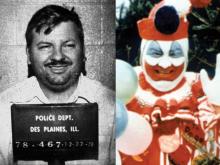
Bothell's Lake Pleasant RV Park
February 5, 1997 would have been Steve Ver Woert's 44th birthday, but he didn't make it to work on time that day at his job at a cellular phone company in Redmond, Wash., home to software giant Microsoft and many other high-tech firms. When the usually reliable Ver Woert still hadn't made it to work by midday, a co-worker was sent to find out why. When she arrived at Ver Woert's fifth-wheel-type trailer in nearby Bothell's Lake Pleasant RV Park, she found blood just outside the front door and called the Bothell police.
by Gary Boynton
Patrol Officers Lawson and Seuberlich responded to the call and entered the stylish trailer through its unlocked front door. After passing through the kitchen, they found Ver Woert's body lying facedown in a pool of blood in the living room. They checked to make sure that he was dead, then carefully left the trailer, so as not to disturb any possible evidence, before calling in to report what they had found.
Bothell Police Sergeant D.C. Nielsen arrived at the scene shortly. Paramedics soon joined him. They confirmed that the victim, who appeared to have been stabbed in the back and then to have had his throat cut, was indeed dead.
Two Bothell detectives, Ed Hopkins and Denise Langford, were next to arrive, followed by Det. Olsen, who would process the crime scene along with a team from the Washington State Patrol Crime Lab. Dan Christman, a blood-spatter specialist from the Snohomish County Medical Examiner's Office, and Dr. Eric Kiesel, the medical examiner, also came to examine the body.
The investigators noted that an exercise bike had been knocked over near the body and several boxes appeared to have been thrown around, both indicating a possible struggle. A Bible lay open on a nearby table.
Det. Olsen and the forensics team processed the inside of the trailer, searching for fingerprints, blood, hair, fibers, and blood stains. Anything with blood on it was taken so that a possible DNA match could be made. The processing of the crime scene lasted until 4 a.m.
Dets. Langford and Hopkins interviewed Ver Woert's neighbors, friends, and co-workers. According to everyone they talked to, the victim was very nice; the worst thing that anyone said about him was that he gave too much money to religious groups.
The detectives learned that Ver Woert had moved to the area from Arizona a few months earlier. At work, where he was a special projects manager, he had already become one of the most well liked people at the company. According to his co-workers, he was somewhat of a genius in cellular phone technology, and he was mentoring several fellow employees. He was also dating an employee of the company who worked at another branch. When police contacted her, she told them of a strange experience she'd had the night before his murder. She had received a pager message to call Ver Woert and, after a bit of high-tech phone tag, she ended up getting a voice-mail message with Ver Woert's voice and that of another man in the background. She wasn't alarmed, but thought it odd enough that she played it for a friend before erasing it. When she tried to call Ver Woert again later that evening, she got no answer. The detectives believed he was killed sometime between the two calls.
None of Ver Woert's neighbors at the RV park reported seeing or hearing anything unusual on the night of the murder; nor did they recall seeing anyone visit Ver Woert.
With no suspects and no motive, Dets. Hopkins and Langford expanded their investigation to the Phoenix area, hoping that they might come up with something to explain why such a well-regarded individual had been so brutally slain.
Hopkins and Langford met first with officials of the Mesa Police Department, who pledged their cooperation and support in the investigation. Mesa Det. Tom Denning was assigned to assist the Bothell detectives.
The detectives began by interviewing some of Ver Woert's family and friends. All of them, including his ex-wife who still lived in the area with their 11-year-old son, confirmed the positive things that had been said about the victim by his associates in the Seattle area. According to his ex-wife, Ver Woert was "a very nonviolent human being, who was a devoted father."
Friends and family did, however, mention that Ver Woert had been married briefly once before and that his first ex-wife, Marty Malone, continued to pester him for money. According to Ver Woert's other ex-wife, Malone was "very adversarial, very vindictive, and often angry."
When the detectives arrived at Malone's home in Scottsdale, they knocked on the front door and were greeted by a large, decidedly unattractive woman wearing a skimpy T-shirt. Upon learning that Hopkins was a detective from Bothell, Wash., Malone said she only knew one person up there, her "good friend and ex-husband, Steve Ver Woert." She told the detectives that she was in Las Vegas at the time of the killing, without inquiring as to the exact date and time of the murder. Malone commented that "this was bad timing." She was unable to provide a location where she had stayed in Las Vegas, but claimed that she had passed out business cards at banks, casinos, and hotels in the area. When pressed, she could not provide any specific locations where she had done so. She finally claimed that she had picked up two men in a casino and did not remember where they had stayed.
Later in the interview, Malone mentioned that she had Ver Woert's original will in her possession and she asked about how probate worked in the State of Washington. In the will, Malone was named as beneficiary of the entire estate.
The detectives noted that Malone showed no emotion during the interview, but were struck by her inordinately friendly manner, especially toward Det. Hopkins.
Hopkins and Langford returned to Bothell later that day. Malone called Hopkins around 9 that evening, and inquired about her ex-husband's death certificate, mentioning the will three times during the 10-minute conversation. She also mentioned that she had two life- insurance policies on Ver Woert totaling $150,000, and that she maintained a separate checking account for payment of those policies.
Hopkins soon returned to the Phoenix area. He learned from a credit card check that
Malone's 1996 Nissan Pathfinder had been serviced at a car dealership in Scottsdale on Feb. 3, 1997, at which time its odometer showed 10,115 miles. According to police interviews with staff at the dealership, Malone had told them she "was going on a trip to Montana, to collect money owed to her by a former business associate." The staff at the car dealer also recalled seeing several suitcases in the Pathfinder.
The vehicle was serviced again on Feb. 13. After arranging to have Malone brought in to be fingerprinted, detectives went to the dealership and checked its mileage. The odometer now showed 13,226 miles. The increase in mileage was consistent with a trip to Washington.
At this point in the investigation, Hopkins began having regular contacts with Malone, who took him out for drinks and meals. According to the detective, she "appeared to be behaving in a romantically or sexually suggestive manner." In order to maintain her confidence, Hopkins pretended that he was unhappy at the Bothell Police Department and wanted to move to the Phoenix area, where he said he could work for the Mesa Police Department. He said Malone seemed very interested in the idea.
At a subsequent meeting, Hopkins told Malone that he was definitely moving to Arizona and asked her for $5,000 in moving expenses, which she agreed to pay him.
The next day, Hopkins drove Malone to a secluded spot in a nearby parking lot in Scottsdale. Unknown to Malone, her conversation with Hopkins was being both audio and video recorded by a Mesa Police Department surveillance team. (In Arizona, such court-ordered recordings require the consent of only one party, in this case Hopkins.)
In the parking lot, Hopkins told Malone that he was no longer interested in investigating Ver Woert's death and asked her to give him some of the insurance money. Malone then told the detective that she had planned her ex-husband's murder and had agreed to pay a friend of hers, Jonathan Craig Curtis, $25,000 for murdering Ver Woert. She said that she and Curtis drove together to Bothell in her Pathfinder and that she waited in the vehicle outside a tavern while Curtis went to Ver Woert's trailer.
Malone said that after the murder, she and Curtis drove to Ellensburg, in central Washington, where they discarded Curtis's bloody clothing in a garbage bin at a fast-food outlet.
During the tape-recorded conversation, Malone also offered Hopkins $50,000 to kill Curtis, and said she would also give him the $25,000 she had promised Curtis.
Malone was arrested in the parking lot. At first, she tried being deceptive and denied what she had said on the tapes. Then, she called for a lawyer.
The detectives now turned their attention to the alleged hit-man, Curtis. They went to his place of employment, a construction firm. Curtis's employers were shocked to hear that he was involved in a murder investigation. They depicted him as a good, dependable worker. They did verify that Curtis took time off during the time period when he allegedly drove to Washington with Malone to kill Ver Woert. He had told his employers that he was going to Spokane to visit his daughter.
Others who knew Curtis painted a different portrait of him. They said that he was boastful and pushy.
Curtis, a balding, medium-sized man, who looked older than his 45 years, was arrested while stopping for coffee at a convenience store on his way to work. He said nothing about the case and immediately called for a lawyer.
The Maricopa County Attorney's Office and Mesa City Police Department decided not to prosecute Malone for conspiracy to commit murder for her efforts to get Det. Hopkins to kill Curtis. They felt that it would have been a much lesser charge than the one facing her in Washington.
Neither Malone nor Curtis fought extradition. On the plane ride back to Washington, Curtis conversed with the Bothell detectives who had been sent to escort him. He talked about hunting in his native Montana and bragged about once shooting an elk while sitting on his front porch.
Curtis told one of the escorting officers that he couldn't believe that Malone had tried to have him killed. When the officer mentioned that detectives had found out about a pull-tab connecting Curtis to a tavern near where Ver Woert was killed, Curtis put his head down and almost started to cry.
Upon their return to Washington, Malone and Curtis were booked into the Snohomish County Jail in Everett. Two days later, they were formally charged with aggravated first-degree murder in the death of Steven Ver Woert. They both entered pleas of not guilty.
Although investigators knew that both suspects were involved in the murder, they were not yet sure which of them had actually done the killing. In her tape-recorded conversation with Hopkins, Malone maintained that she had stayed behind in her car outside a nearby tavern while Curtis killed Ver Woert. Curtis, however, said that their roles were reversed.
Detectives went to the Bigfoot Tavern, where each of the suspects claimed to have stayed in Malone's Pathfinder while the other was committing murder. They confirmed that Curtis had been there, learning that he had used his driver's license as ID to claim winnings from a pull-tab. No one at the bar could clearly recall seeing Curtis there the night of the murder. Several people did pick Malone out of a photomontage as a woman who'd been hanging out at the Bigfoot that night.
Curtis was given a polygraph examination on his version of the crime. He flunked it.
Curtis's small, ramshackle trailer in Phoenix was searched. A number of knives were found, some of which were of the type used on Ver Woert, but none had any blood on them, nor could they otherwise be matched to the crime.
Detectives also learned about Malone and Curtis by talking to people who knew them. They learned that the two of them had met in a Phoenix area bar a couple of years earlier and that they had often played pool together since then. Malone lived in a house in Scottsdale, with one female and two male roommates, each of whom she had met in local bars. A search of her house resulted in the seizure of copies of the life-insurance policies she had taken out on Ver Woert.
According to family and friends, Malone loved to throw parties, especially on birthdays. Investigators wondered if it was more than mere coincidence that Ver Woert was murdered on the eve of his 44th birthday.
It was also learned that Malone had been married twice before. Both of her earlier husbands had died quite young of heart attacks and had been quickly cremated. Foul play could not be proven in either case, but in light of her current predicament, investigators could not help but have their suspicions.
With the photo line-up and Curtis's failed polygraph examination now confirming Malone's contention that Curtis had actually committed the murder while she waited outside the Bigfoot Tavern, prosecutors offered her a plea bargain. The offer was, however, contingent upon her agreeing to testify against Curtis, and to her passing a polygraph examination on her version of the crime.
After a long, arduous debriefing by prosecutors, Malone passed the polygraph test and agreed to testify against Curtis. In exchange for her testimony, she was allowed to plead guilty to a reduced charge of first-degree murder, thereby avoiding the mandatory sentence of life in prison or death that came with the original charge.
Curtis did not take this turn of events lightly. In a handwritten note that was later turned over to authorities, he tried to get a fellow inmate to provide a phony alibi for him. The inmate, a former bounty hunter, also told authorities that Curtis offered him $20,000 if he would arrange to have Malone killed by a drug overdose in the women's jail. Instead, the inmate agreed to testify against Curtis.
With the aid of bloodhounds, the Bothell police sifted through 500 tons of garbage in a landfill near Ellensburg, looking for the bloody clothing that Malone said she and Curtis had dumped at a fast-food restaurant in that area. Eight or nine items were eventually seized, but lab tests failed to link any of them to either Curtis or Ver Woert.
Lab tests on the many items taken from Ver Woert's trailer failed to find any link to Curtis or Malone. The case against Curtis would have to be made in other ways.
Jury selection began on Dec. 15, 1997, and opening statements were made the next day. Chief Criminal Deputy Jim Townsend outlined how Malone had hired Curtis to kill her Ver Woert and then tried to hire Det. Hopkins to kill Curtis. Townsend also revealed, for the first time, how Curtis had tried to hire a fellow inmate to kill Malone.
"This case is about greed, stupidity and senseless violence," Townsend told the jury.
Curtis's defense attorney, Jett Whitmer, agreed, but added that it was also about an innocent man being set up by a ruthless woman who manipulated police and prosecutors. Malone set Curtis up to take the fall for a killing she actually committed, Whitmer said. He added that authorities had bought into the story even though "not one speck" of physical evidence linked Curtis to Ver Woert. Whitmer also questioned the motivation of the inmate for testifying against Curtis, noting that both the inmate and Malone had received deals from prosecutors.
Whitmer told the jury, "You must decide what you believe."
Townsend and his deputy, Ed Stemler, presented a parade of witnesses to set the stage for their star witness, Malone. Det. Hopkins told the jury how he had played to Malone's prejudices and gained her confidence. He said he had acted nervous, as if he really had something at stake in their deal.
Townsend, a 20-year veteran of the prosecutor's office, handled the direct examination of Malone, whom he considered the most bizarre person he'd ever encountered. He carefully took her through the planning and execution of her ex-husband's murder. She stood by her story that she and Curtis had gone together to the Bigfoot Tavern, but that she had stayed in her car while Curtis left to kill Ver Woert.
On cross-examination, Whitmer tried but failed to get Malone to say that she committed the murder, while his client, Curtis, had stayed behind
The prosecutors then played the 45-minute tape of Malone's confession to Hopkins. Jurors heard Malone tell the detective how she had hired Curtis to kill Ver Woert and how the plot had been carried out. They also heard her ask Hopkins to kill Curtis, offering him $50,000 and a motorcycle.
The prosecution then called the inmate, who testified that Curtis had tried to hire him to arrange a drug overdose in the women's jail to kill Malone.
Curtis took the stand in his own defense. Under questioning by his attorney, he admitted to being a liar and a braggart, but denied killing Ver Woert. He claimed that Malone had hired him as a driver and that he was asleep in her car outside the Bigfoot Tavern when she left to do whatever "business" she had come to do.
In his summation, defense attorney Whitmer again attacked the credibility of the two main witnesses against Curtis, Malone and the inmate, saying that both were only out to cut themselves sentencing deals. Whitmer also questioned why Curtis would kill someone with a knife when he took a gun on the trip, why he hadn't tried to establish an out-of-state alibi as Malone had, and why he would give his name and social security number for the pull-tab winnings if he were the careful killer whom prosecutors had described. After again pointing out the lack of any physical evidence linking his client to the murder, Whitmer accused prosecutors of developing "tunnel vision" and refusing to investigate whether the evidence implicated Malone as the killer. He closed by asking why Malone would have accompanied Curtis to Washington if she had already arranged the hit.
In his summation, Stemler said Malone wasn't likable but she was believable. He pointed out that she had admitted to Hopkins that she was "guilty as hell" in Ver Woert's death, hardly the words of a woman plotting to escape prosecution.
Stemler said that Malone accompanied Curtis to Washington to make sure the job was done right. Stemler said the reason Curtis used a knife was because a gunshot would have drawn neighbors to the scene. The prosecutor also revealed that the informant who testified that Curtis tried to buy an alibi knew one piece of evidence detectives had withheld from the public, that Ver Woert's throat had been slashed.
Stemler concluded his closing remarks by reminding the jury about the strange phone call that Ver Woert's girlfriend got right before his death. "There was a man inside the trailer that night," Stemler said.
After deliberating for parts of two days, the jury found Curtis guilty of aggravated first-degree murder.
As guards led Curtis down the hallway to the Snohomish County Jail, Det. Hopkins shouted, "Enjoy your stay, Mr. Curtis."
"Go to hell," responded the convicted hit man, displaying emotion for the first time since the reading of the verdict.
At her sentencing hearing, Malone, now 44, blamed alcohol and hurt feelings about their failed marriage for her decision to hire a hit man to kill her ex-husband. She stood before Snohomish County Superior Court Judge Joseph Thibodeau and told how the idea of having Ver Woert killed came to her as she read a sign in a bar. The sign proclaimed that some people are alive only because it is against the law to kill them.
Malone claimed that she was drinking heavily at the time, and continued to do so right until she traveled with Curtis from Arizona to Bothell. "That's how it started and how it ended, in a fog of alcohol," she told the court.
Prosecutors maintained that money was her motivation. Chief Criminal Deputy Jim Townsend called the murder of Ver Woert "a very evil crime." Townsend said "the only motive that can be found in this situation was pure greed."
Malone was sentenced to 23 years in prison, which prosecutors had agreed to as part of her plea bargain. Curtis received a sentence of life without the possibility of parole.








